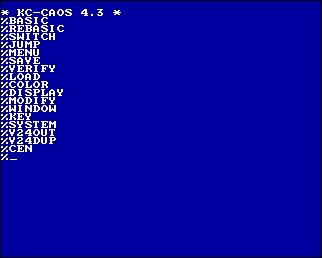CFOG's PIP, August 1987, Volume 5 No. 10, Whole No. 58, page 2
Reflections Over Lunch
by James F. Taylor
[This article was originally published in the Y.O.U.r CCP/ Newsletter -- a joint publication of the Yankee Osborne Users Group and the Connecticut CP/M Users Group. -- bhc]
I was at a business lunch the other day when the conversation (as it often does at business gatherings these days) turned to computers.
"What system do you have?" I was asked.
"Kaypro II," I proudly replied. And like Arlo Guthrie once said, "they all moved away from me on the bench."
"CP/M is dead," one of the men at the table said.
"Not at all," I said, "In fact I'm getting new software almost every day for my machine. And you know what?" I grinned, "It's all public domain stuff. It costs me only the price of a diskette."
The conversation at the table quickly changed to tales of hard disks and megabyte spreadsheets.
Listening to the prattle around me, I came to an interesting discovery. Yes, it was true. These people had systems with greater memory and more capabilities than my humble Kaypro. But no one was really using much of this power.
It really hit home when the Nuclear engineering consultant mentioned that his $70,000 IBM system turned out to be incompatible with the software he wanted to use for his customers work. Of course, he said, his clients paid for the equipment, so HE didn't lose any money.
Around and around the conversation went. It finally struck me that the only person at my table who was really satisfied with what his computer could do was me. Me and my "inferior" 8-bit CP/M machine.
I couldn't resist mentioning the new 32-bit systems and how MS-DOS would soon be "obsolete."
Suddenly, the conversation shifted again. You'd be surprised at how many people are interested in the new tax laws.
And what is the moral of this little tale, dear friends?
Simply put, it is:
Yes, Virginia, there are more powerful systems then those that run CP/M. MS-DOS has more features, more memory, and companies that provide product support. There are a multitude of magazines that sing its praises. And they even run flashy ads during the Super Bowl.
But what doesn't it have? It doesn't have dedicated people who love their machines, who go to the trouble to study every nook and cranny of their capabilities and perhaps, more importantly, their possibilities. And MS-DOS does not have users that really know their machines and who band together to ensure their survival.
All-in-all, the worshippers of Big Blue and associated cults may have more power and potential than us, but in the long run that doesn't really matter.
After all, it's not what you have, it's what you DO with it that counts.
[Maybe Mr. Taylor ought to move to Chicago and join CFOG -- here we have folk using CP/M and MS-DOS <among other systems> who are dedicated, love their machines, study them, and are friendly helpful types who are interested in what their machines can accomplish for them and their fellow CFOGgers. -- bhc]

